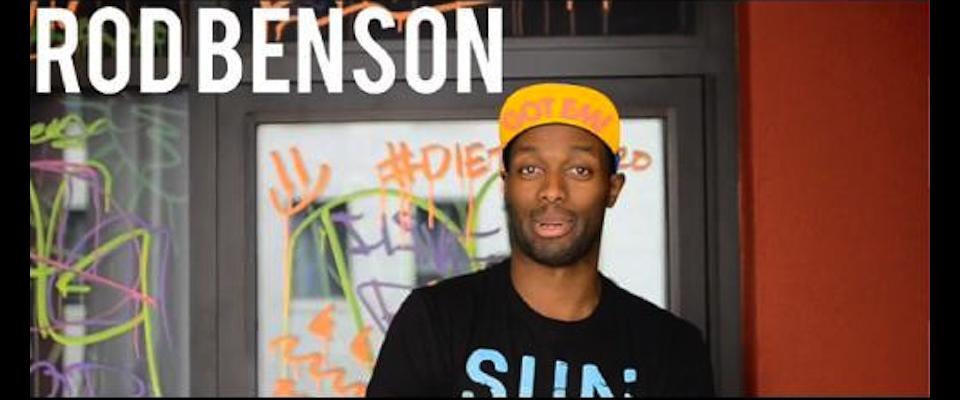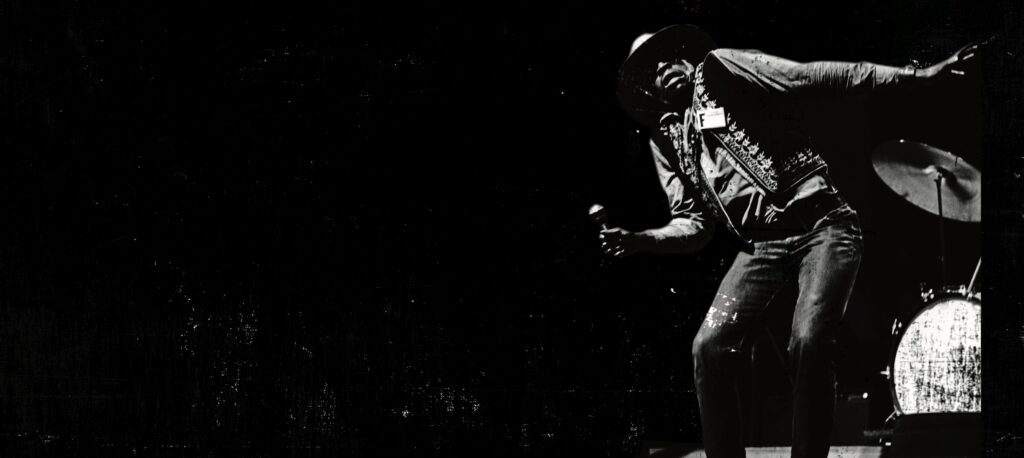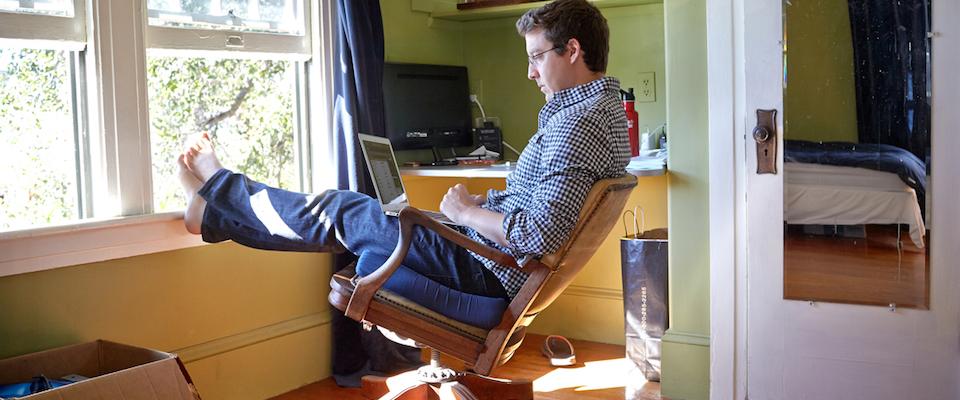The minor celebrity of Rod Benson
The sun hangs low over Manhattan Beach, giving the ocean a SoCal-postcard glow. Inside a fratty, nautically themed bar, Rod Benson is doing shots of vodka with his buddies. As usual, he has drawn a crowd. A fireplug-shaped guy with a tiny, feral mustache tries to impress Benson with his knowledge of Krav Maga, the Israeli martial art. A couple of blonde, tattooed women trade flirty insults with him. On the margins, a shirtless and very sunburned dude sways on his feet, drawn to the spectacle.
Benson, who is 6’10”, is dressed in a black-and-neon-yellow tank top, shorts, and enormous basketball shoes. At the request of one of the blondes, he extends his arms to show his 7’3″ wingspan. He explains all of the attention this way: “I’m both tall enough and black enough to make people wonder, ‘Is he famous?'”
In fact, Benson is sort of famous: He’s arguably the best known pro basketball player to have never played in the NBA.
A 28-year-old former scoring and rebounding leader for Cal, Benson ’06 is a member of the ever-growing tribe of global pro basketball players, a polyglot nation that plays in leagues from Argentina to Germany to Japan. Since graduation, his professional career has included three seasons in the D-League (the NBA’s Development League, its official minor league organization) and a few mercenary tours in France and the Caribbean. In November, he began a lucrative third season in the Korean Basketball League.
Playing overseas is generally a ticket to obscurity, but Benson has managed to parlay it into a certain mid-wattage celebrity, in part by making enthusiastic use of social media. A prolific Facebooker and Tweeter, Benson’s online persona is at once sharp-witted and goofy, an engaging mix of irony and earnestness.
Some of his posts are topical. After Barack Obama’s speech at the 2012 Democratic National Convention, he wrote, “If you just missed that due to the VMAs [MTV’s Video Music Awards], kindly unfriend me. We have nothing in common.” Some offer opinions that could get an NBA player in trouble: Of Oklahoma City Thunder fans, he Tweeted “OKC fans are ‘such good fans’ because they don’t have any entertainment options. It’s like calling me a fan of oxygen. Duh.” And some read like dispatches from the Land of the Bros, like this Tweet from an ESPN party at L.A.’s Playboy Mansion: “Six girls in body paint just walked by. #HeartAttack #PlayboyMansion #StayComposed #BucketList.”
Benson is also the owner of—and sole designer for—his own streetwear clothing company, Boom Tho! In his spare time, he records self-promotional raps and videos that stitch all these threads together.
As a result, he is as much reality star as pro athlete. (As if to confirm that status, MTV “punk’d” him last summer in a prank that involved throwing overripe tomatoes at his car.) He’s a regular on the Los Angeles party circuit, a favorite of American sportswriters, and a bona fide media star in South Korea. As he puts it in a typically self-referential rap, “Oversized, a hipster, a blogger, and also shameless / TMZ trying to figure out what the fuck my name is / But I ain’t famous, though. / Well, maybe kinda sorta.” The chorus finishes the thought: “I guess I don’t have to be famous. / Just famous enough.”
On the morning I first meet Benson, he gives me a tour of his off-season home, a high-rise in downtown Los Angeles that caters to affluent short-timers. His fully furnished rental loft boasts leather couches, stainless steel everything, and floor-to-ceiling views of the city. Benson had been out late partying but rose early, as is his custom, to answer emails and tend to his social media presence.
The life of a pro athlete is binary, sharply divided between in-season and off-season. This effect is intensified for Benson, who spends a semi-monastic eight months in South Korea and, upon his return to California, goes out virtually every night for months on end. “It’s almost like getting out of prison and being handed thousands of dollars,” he says.
This morning Benson is emailing with a Cal buddy named Clayton Bryan, one of Boom Tho!’s cofounders, about logistics for an upcoming trade show. The clothing company’s name is a neologism coined by the company’s third cofounder, Benson’s Cal teammate Jason Gant—it’s an exclamation to mark “an occurrence of an uncommonly good thing.” Over the years it has become Benson’s catchphrase, and it adorns many of his designs—brightly colored shirts, hats, and hoodies that mix preppy beachwear with hip-hop style. Benson says the line is creeping toward profitability. The likes of NBA All-Star forward Blake Griffin and rapper Juelz Santana have been photographed wearing Boom Tho! gear, and 40-odd boutiques from Toronto to Osaka now carry the line. This year they’re adding button-downs and cardigans in a bid to, as Gant puts it, “grow things up a bit.”
His correspondence finished, Benson folds himself into the cockpit of a sporty black Mercedes and we head to the Fashion District, a warren of fabric shops downtown. We bounce from store to store, searching for prints to use in a new line of shirts. On the way out of one shop, a squatty employee carrying bolts of cloth blocks our way.
“You play basketball?” the man asks in heavily accented English, a hobbit addressing Gandalf.
“Sometimes.”
“You’re really big! You ought to play!”
Benson has been hearing stuff like that from total strangers all his life. He grew up in Cardiff-by-the-Sea, a beach town north of San Diego, raised by his mother, Brision Latif, a high school civics and history teacher. (His father, who was in the military, was out of the picture early.) Benson attended Torrey Pines High, a mostly white high school serving wealthy Del Mar. Latif wouldn’t let her son turn out for the basketball team until his junior year—his grades weren’t good enough—but once he started playing, he quickly became dominant. By his senior year, a scouting website had ranked him the number-three center prospect on the West Coast, and the scholarship offers came flowing in—UNC at Chapel Hill, Kansas, Stanford. He chose Cal.
When he arrived in Berkeley, Benson was less the stereotypical jock than the kind of kid who built a website to invite a girl to his senior prom (she already had a date). “He was kind of a nerd,” says Renee Pesiri ’07, a Berkeley law student who became friends with Benson during freshman year. “He taught me the Dewey decimal system.” Indeed, Benson was awed by big-time college basketball culture. “All the other dudes had hot girlfriends and partied,” he remembers. “I was just trying to figure it all out.”
Over the years, Pesiri watched Benson’s outsize persona emerge. “He was a fixture at every party, but he was quiet,” she says. “By the end of his fourth year, he was making the party. It’s kind of like his personality came to match his size.”
His basketball stock was rising, too. By his junior year, Benson was a starter, a team leader in both boards and buckets. He had been dreaming about the NBA since grade school, and now suddenly it seemed within reach.
Then he got hurt. His senior year, the Bears went 20–11 and made it to the NCAA tournament, but Benson watched much of it from the bench, hobbled first by a stress fracture in his heel, then by a knee injury that required surgery. On draft day in 2006, his teammate Leon Powe ’07 got picked in the second round (and went on to win a championship with the Boston Celtics). Benson didn’t get a call.
Undeterred, he moved to Sacramento, where he lifted weights and trained like a demon in the Central Valley heat. He was invited to a host of tryout camps—Golden State, Sacramento, Toronto, Houston, Memphis—and traveled with the Indiana Pacers to play exhibition games in China and Taiwan.
Things never worked out, though. Pesiri recalls hearing from Benson when he was at the New Jersey Nets’ training camp in 2007. “He sent me a picture of a Nets jersey with his name on the back. It was like, ‘This is really happening.’ And then he got cut.”
While waiting for that call-up, Benson joined the D-League. Like all minor leagues, it was both vindication (you’re good enough to play professionally) and purgatory (you’re not quite good enough for the big time). Benson did stints with Austin, Reno, and Bismarck. It was a marginal and often surreal existence. He made poverty-level wages—D-League salaries reportedly max out around $24,000—endured endless bus rides, and heard the country music hit “Save a Horse, Ride a Cowboy” more times than he could count.
At about the same time, he began blogging. Today many pro athletes use social media, but in 2006 it was terra incognita. Almost nobody else was doing it. (Gilbert Arenas, then star guard for the Washington Wizards, was a notable exception.) Benson’s blog, Too Much Rod Benson, quickly became a must-read for basketball fans, and Yahoo’s popular Ball Don’t Lie site offered him a column.
In his dispatches, Benson offered readers a look at the pro life that was as unscripted as it was unglamorous. He wrote about going to the Bismarck WalMart in the middle of the night because there was nothing else to do. He reported, with a fan’s enthusiasm, how great it felt to receive a compliment from Larry Bird. And he blogged about making awkward small talk with a coach who had cut him. “Nothing about this business is that easy,” he wrote, “even the easy stuff.”
Meanwhile, Benson’s three seasons in the D-League were successful by virtually any measure. He was an All-Star in 2008 and a rebound leader, and says he still holds a number of league records. Time and again, though, he watched guys with inferior numbers get called up instead of him. Some observers chalk it up to size: Benson’s not tall enough to be a dominant NBA center, and he’s not bulky enough to bang with the best NBA power forwards. Others suspect Benson’s writing might have had something to do with it.
Henry Abbott, founder of ESPN’s basketball blog TrueHoop, says that although top-tier NBA players are miles ahead of everybody else, “very little separates player 101 from player 1,001.” Benson, he suspects, would have been fine in the NBA. The trouble is that players like Benson can’t afford to have any potential red flags. “General managers are incredibly risk-averse,” Abbott says. “I’m sure the social media didn’t help. ‘Let’s get the guy who shakes things up on Twitter!’ No GM says that.”
So after three seasons in the D-League, Benson felt stuck. He had played briefly in France and in the Caribbean, but now he was considering a big move. The Korean league had been scouting him for months—and they paid real money. Finally, he made the jump.
Since its birth in a Massachusetts gym in 1891, basketball has become a truly global game. The NBA now has Nigerian, Lithuanian, and Chinese players, and the migration of American players overseas has grown in turn: At last count, there were nearly 7,000 ex–college players in professional leagues worldwide.
The cultural challenges of international play go beyond mere language differences. In Iran, spectators have reportedly thrown stones at players who were performing badly. Tales circulate of Russian team owners threatening to murder players to avoid paying contracts. At the end of an 11-day stint in the Dominican Republic, a team representative met Benson at his hotel, drove him around the block a few times, and handed him an envelope containing $8,000 in cash—his payment. Dropped back at his hotel, Benson spent a sleepless night waiting for his flight.
Benson’s biggest problem in South Korea has been the isolation. He spent his first two years playing for a team in Wonju, a sleepy town in central Korea. None of his teammates spoke English. When he wasn’t practicing, he watched movies, Skyped with friends back in America, and worked on clothing designs. Sometimes he’d get a drink with an English-teacher friend. Other times, he’d just Tweet his loneliness. “Soju + Fanta + Breaking Bad + nobody else. = My Friday night.”
Americans play a pyrotechnic role in most offshore leagues—their job is to shoot whenever they touch the ball. The Korean league, however, also values defense, and Benson, who is solid on both sides of the ball, has proven a good match. He was named league MVP last season, averaging nearly 20 points and 13 rebounds a game while taking his team to the finals. And though the best Korean team would struggle against an average Pac-12 squad, the pay in Korea is near the high end of the global scale. Benson made $50,000 a month last season. At the same time, there are no guaranteed contracts. Last season, a former NBA center named Olumide Oyedeji had a bad game against Benson and was cut the next day. “If you don’t produce,” Benson says, “you’re going home.”
Benson’s job may be more secure than most, in part due to his popularity off the court. He has appeared on the Korean answer to Saturday Night Live, and he is mobbed everywhere he goes, plied with love letters and gift baskets by female fans. His friend Pesiri visited him last year and was stunned by the adulation. “We’d walk out of the stadium and there’d be a sea of people waiting for him,” she recalls. Now that he’s playing for a team in Seoul, his fame seems likely to grow.
That doesn’t mean he’s forgotten the NBA. It just means the wounds aren’t so raw anymore. “It was really hard for a long time,” he says. “I spent three years busting my ass trying to get into the NBA, but to no avail. And then I go overseas and they love me. I’m content with that.”
What if he suddenly got a call from an NBA team? “Like, right now? I would go.”
Personal branding is a lot easier if you’ve got something solid to hang it on—a stellar career in the NBA, for example. “People follow pro athletes because they’re pro athletes,” says David Neiman, president of Athlete Interactive, a Los Angeles firm that manages digital branding and social media for the likes of Knicks center Tyson Chandler. “Without that, it takes something really special to get people’s attention. Name me one other D-League player who never made it to the NBA. I can’t name one.”
Benson has succeeded by combining the leftover buzz from his blog notoriety with sheer force of personality. “You could book Rod on The Tonight Show and he’d be funny,” ESPN’s Abbott says. “You can’t say that about many pro athletes.” To hear Benson tell it, there’s no master plan at work. “To say I’m not conscious of my brand would be a lie, but to say there’s a specific strategy in building it would also be one. I’ve just always done things that I thought were fun.”
Benson’s idea of fun includes wearing a giant furry head designed to look like his own face, complete with blocky professorial glasses and baseball hat. The other Boom Tho! guys have heads, too, and sometimes they hit the clubs wearing them. Though the head serves a marketing purpose—Benson wore it during the dunk competition of the Korean league’s All-Star Game—he says it was created on a whim. “It came from a question: ‘How stupid would it be to have a mascot of yourself?’ ‘That would be really stupid. We should do it.'”
What comes next for Benson? Law school? Politics? Motivational speaking? All are possibilities, he says. For now, he’s happy—and proud—to still be an active player. He calls up a scouting report from 2001 listing the top high school basketball prospects. Some of them starred in college. A few starred in the NBA. The vast majority, though, are out of basketball entirely. “When this list came out, they probably all thought they’d play for years,” he says. “I’m very fortunate. I can admit that.”
On my final day with Benson, I accompany him to the downtown YMCA for a lunchtime pickup game. A few times a week he makes the drive to Santa Monica or Hollywood to play competitive games against NBA regulars. The Y, though, just a few minutes from his loft, provides a maintenance session. As office workers of all ages and sizes filter into the gym, Benson gazelles down the court for a layup, then backs off and banks one in from the elbow. Time to play.
The off-season rust shows in the first game. He misses a few easy putbacks; a jumper clanks off the rim. Even so, Benson might as well be playing a different sport. He steals the ball from a guy built more like a linebacker than a basketball player, flipping it to his outlet man for an easy layup. In retaliation, the guy fouls Benson hard on the next sequence.
Benson chews him out: “Chill out! You could get somebody hurt with that bullshit!” A few plays later Benson dunks over the guy, hanging from the rim above him as if considering a piggyback ride. “Sorry, boss,” Benson says, not very convincingly, when he returns to earth.
A gray-haired teammate of Benson’s sees me scribbling notes and asks me who he is. I tell him. He looks at Benson again. “I had no idea.”




















